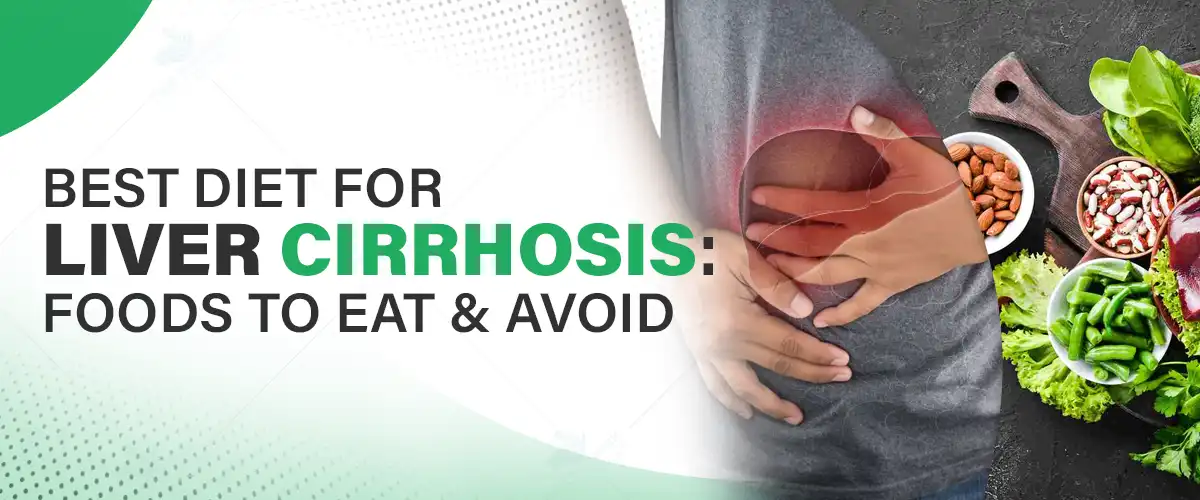
Subscribe to our

Liver cirrhosis is a serious condition in which healthy liver tissue is gradually replaced by scar tissue, leading to impaired liver function. A well-balanced diet plays a crucial role in managing liver health, reducing complications, and improving overall well-being. Choosing the right foods for liver cirrhosis can help slow disease progression and support liver function. For those seeking expert care, consulting the best hospital for gastroenterology is essential for personalized dietary and medical guidance.
Our specialists at Felix Hospital provide advanced treatment and dietary support to improve your liver health. Call us today at +91 9667064100.
Liver cirrhosis is a chronic liver disease caused by long-term liver damage. As scar tissue replaces healthy tissue, the liver’s ability to function properly declines.
Maintaining a well-balanced and nutrient-rich diet is crucial for individuals with liver cirrhosis. The liver plays an essential role in digestion, metabolism, and detoxification, and when its function is compromised, proper nutrition becomes even more important. A well-planned liver cirrhosis diet can help slow the disease's progression, reduce complications, and enhance the patient’s quality of life. Below are the key nutritional aspects that must be considered:
1. Balanced Diet
A balanced diet ensures that the liver receives all the essential nutrients it needs for optimal function. Patients with liver cirrhosis are at a high risk of malnutrition due to poor digestion and reduced nutrient absorption. Therefore, a well-structured diet should include a mix of proteins, carbohydrates, healthy fats, vitamins, and minerals to support overall liver health and prevent deficiencies.
2. Protein Management
Protein is essential for maintaining muscle mass and preventing muscle wasting, a common issue in liver cirrhosis patients. However, excessive protein intake can strain the liver and contribute to a buildup of toxins in the body, potentially leading to complications such as hepatic encephalopathy. To strike the right balance:
3. Sodium & Fluid Control
Liver cirrhosis can cause fluid retention, leading to swelling in the legs (edema) and abdominal bloating (ascites). Reducing sodium intake is essential to prevent excessive water retention. Some important tips include:
4. Nutrient-Rich Foods
Liver cirrhosis patients often have vitamin and mineral deficiencies, making it important to consume nutrient-dense foods.
A liver cirrhosis diet plan should focus on incorporating nutrient-rich foods that support liver function while minimizing further damage. Here are some of the best dietary choices:
1. High-Protein Foods
Consuming adequate protein is essential to prevent muscle loss and maintain overall health. The best protein sources for liver cirrhosis patients include:
2. Fruits & Vegetables
Fruits and vegetables are loaded with vitamins, minerals, and antioxidants that help fight inflammation and protect the liver. Some of the best options include:
3. Whole Grains
Whole grains provide fiber, which aids digestion and helps regulate blood sugar levels. They are also packed with essential nutrients that promote liver function. Some healthy whole grains include:
4. Healthy Fats
While high-fat foods should be avoided, healthy fats play a crucial role in liver function and overall health. The best sources of healthy fats include:
5. Liver-Friendly Beverages
Hydration is essential for liver health. Certain beverages can support liver function and detoxification:
Certain foods can worsen liver damage and should be completely avoided or minimized. These include:
1. Processed & Fried Foods
2. High-Sodium Foods
3. Alcohol & Sugary Drinks
4. Red Meat & Saturated Fats
5. Excessive Dairy
If you are noticing early signs of liver cirrhosis, seeking expert medical advice is crucial. Felix Hospital is home to some of the finest liver specialists, including Dr. Jagatjot Singh Gill and Dr. Amrit Yog Datley. Renowned as two of the best gastroenterologists in Noida, they provide advanced diagnosis and cutting-edge treatment for liver diseases, ensuring exceptional patient care and optimal health outcomes.
Consult our expert gastroenterologists at Felix Hospital for personalized dietary and medical guidance on managing liver cirrhosis. Book an appointment now!
Managing foods for liver cirrhosis effectively can improve liver function and overall health. A balanced liver cirrhosis diet plan includes high-protein foods, fresh fruits and vegetables, whole grains, and healthy fats while avoiding processed foods, high-sodium meals, and alcohol. For the best care, consult a healthcare provider to create a personalized dietary plan. Adopting a liver-friendly diet is crucial for maintaining liver health and enhancing quality of life.
1. Can liver cirrhosis be reversed with diet alone?
Ans: No, while a liver-friendly diet can slow disease progression and improve liver function, cirrhosis-related scarring is usually irreversible. However, proper nutrition can help manage symptoms and prevent further damage.
2. Are plant-based diets beneficial for liver cirrhosis patients?
Ans: Yes, plant-based diets rich in legumes, whole grains, fruits, and vegetables can help reduce liver inflammation and improve digestion. However, patients must ensure adequate protein intake from plant sources like lentils, beans, and tofu.
3. What are the best protein sources for liver cirrhosis if I’m vegetarian?
Ans: Plant-based protein sources such as quinoa, lentils, chickpeas, nuts, seeds, and soy products (tofu, tempeh) are excellent choices. Greek yogurt and low-fat dairy are also beneficial options.
4. Can I drink coffee if I have liver cirrhosis?
Ans: Yes, moderate coffee consumption has been linked to liver health benefits, including reduced inflammation and a lower risk of liver disease progression. However, avoid adding excessive sugar or cream.
5. Should liver cirrhosis patients take vitamin supplements?
Ans: Some patients may require vitamin supplements, especially for deficiencies in vitamins A, D, E, K, and B-complex. However, supplementation should only be taken under a doctor's guidance to avoid liver strain.
6. How does salt intake affect liver cirrhosis patients?
Ans: Excess sodium can lead to fluid retention and worsen complications like edema and ascites. Reducing salt intake by avoiding processed foods and opting for fresh, homemade meals is essential.
7. What lifestyle changes can help manage liver cirrhosis better?
Ans: In addition to a liver-friendly diet, patients should quit alcohol, maintain a healthy weight, engage in light physical activity, stay hydrated, and follow their prescribed medications and treatments.